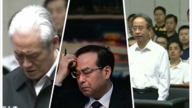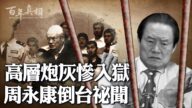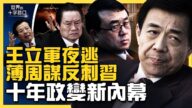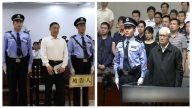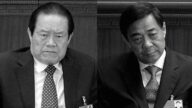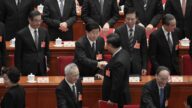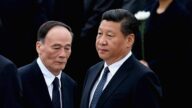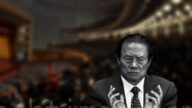【新唐人2014年06月17日讯】中共政协副主席苏荣,因违纪违法,被中纪委调查后,有关苏荣被国际通缉的往事,再次进入公众的视线。而这样一位副国级高官此时落马,又是什么原因呢?请看专业人士的分析。
作为副国级高官的苏荣落马,有关他是“国际逃犯”的一段往事,也再次被提起。
2004年10月末到11月中,时任甘肃省委书记的苏荣,随中共代表团访问非洲部分国家,在这期间,他接到了赞比亚高等法院的工作人员亲自递交的法院传票。在海外的中国法轮功学员,因苏荣追随前中共党魁江泽民的政策,迫害法轮功,因此将他以“谋杀罪、酷刑罪”等告上了当地法庭。
苏荣接到传票后,被扣留在当地等候传讯。但在中共领馆的协助下,苏荣提前偷越边境潜逃到津巴布韦和南非,然后从南非飞回中国。2004年11月8号,苏荣没有出庭受审,也因此被控“蔑视法庭罪”。赞比亚警方发出通缉令,要逮捕苏荣。
对于现在中共调查苏荣,时事评论员蓝述分析,北京是希望同时达到三个目标。
时事评论员蓝述:“苏荣他曾经被法轮功学员告上国际法庭,所以他属于在社会上民愤很大的,所以第一,它能够减轻对中共这个体制的民愤。因为镇压法轮功,(是)中国社会影响面非常大的一件事情,在国际上也是引起同声谴责。”
蓝述说,中国社会随着经济放缓之后,各种社会矛盾更加突出。当局在尖锐的社会矛盾中处理贪污腐败的官员时,主要考虑到三方面:首先能在一定程度上降低民愤,安抚民意,缓和社会矛盾。
蓝述:“第二,它能够在一定程度上,起到打击贪官的这么一个榜样性的作用。还有第三个方面,苏荣他跟江系有很深厚的关系,所以说这又符合了它的第三个目地、派系斗争。”
据了解,现年65岁的苏荣,从吉林农村的大队会计做起,53岁之前没有离开过吉林。2001年后,苏荣历任青海、甘肃和江西的省委书记。而江西是中共前国家副主席曾庆红的老家。
苏荣和现任中共政治局常委张德江、和江泽民时期的“中办”主任王刚、以及前统战部长杜青林等人,都属于“吉林帮”。媒体形容江西官场“地震”,而“苏荣落马,说明反腐没有‘碰不得’的人”,媒体还暗示“副国级以上还有‘大老虎’”。
美国《中国事务》杂志总编辑伍凡:“完全是派系斗争,利益关系。共产党内部斗争的很厉害,习近平也拿了十三个位置,可是下面做梗啊。尤其最近李克强拍桌子大骂,还解决不了问题,不听你的。已经妨碍到了习近平要推行他的路线和政策,他都一层一层把他剥掉。”
最近大陆媒体广泛报导,中共国务院总理李克强因“政令不出中南海”而发怒,拍了桌子。
伍凡:“共产党斗争越来越厉害了,结果共产党越斗越死,越斗越弱。它越反腐,它就失败了。它的目地跟你不一样,它的目地是要维护它的政权,这是它的根本的目地。”
民众高调嘲讽中共党媒早前曾正面报导苏荣强力“反腐”。还有网友把与苏荣同级别的陈希同、成克杰、陈良宇和薄熙来的照片排在一起,以所谓“改革开放”后落马的党和国家领导人为题,在网上讽刺当局所谓的“反腐”。
民众公开指出:“什么是中共最大的腐败,苏荣这个身为全国政协副主席的中共高官,再一次用铁的犯罪事实告诉我们,不受制约的公权,才是中国真正最大的腐败。”
采访编辑/唐音 后制/萧宇
What’s Beijing’s Purpose Behind Su Rong’s Sacking?
Su Rong, Vice Chairman of the National Committee of the
Chinese People’s Political Consultative Conference (CPPCC),
is under investigation by the disciplinary commission for
violation of the Chinese Communist Party (CCP) rules.
Meanwhile Su Rong is wanted overseas, which is also being
highlighted in public.
What is the reason behind his downfall as he is a
national-level official?
When Su Rong was dismissed, his ‘international fugitive’
status was brought up again.
Between October to mid-November 2004, Su Rong, was
Secretary of Gansu Province.
When visiting Africa with the CCP delegation, he was served
a court summons by staff of the High Court of Zambia .
Overseas Falun Gong practitioners are prosecuting him for
‘crimes of murder and torture’ in the local court.
Su followed former CCP leader Jiang Zemin’s policy of
persecuting Falun Gong practitioners.
After receiving the summons, Su Rong was detained locally
and waited for the subpoena in Zambia.
However, helped by the CCP Consulate, Su Rong illegally
fled to Zimbabwe and South Africa, then flew back to China.
On November 8, 2004, Su Rong failed to appear in court.
He was accused of contempt of court on top of the other
charges. Zambia police issued a warrant for Su Rong’s arrest.
Lan Shu, current affairs commentator believes Beijing wishes
to achieve a number of goals from Su Rong’s arrest.
Lan Shu “Su Rong is being sued at an international court by
Falun Gong practitioners.
So he has caused great public anger in society. Arresting him
can reduce peoples’ anger towards the CCP.
The suppression of Falun Gong has been a very big impact on
Chinese society, causing international condemnation as well.”
Lan Shu said, along with the economic slowdown,
various social conflicts have become sharper.
When dealing with corrupted officials under such
social contradictions, the CCP mainly considers three aspects:
First of all, to reduce public anger to appease the public
and ease social conflict.
Lan Shu: “Secondly, it can set an example of fighting against
corrupted officials.
Thirdly, Su Rong has very strong ties with Jiang’s faction,
so taking him down creates factional struggles.”
It is understood that Su Rong is 65 years old.
He started out as an accountant in a village in Jilin Province.
He never left Jilin before the age of 53.
After 2001, Su Rong served as party secretary of Qinghai,
Gansu and Jiangxi Provinces.
Jiangxi Province is the hometown of the CCP’s former
national chairman Zeng Qinghong.
Su Rong, Zhang Dejiang, current CCP Politburo Standing
Committee, Wang Gang, director of General Office in Jiang
Zemin’s era, and Du Qinglin, former director of United Front
Work Department, all belong to the ‘Jilin Gang’.
Media describe this as the Jiangxi official earthquake and
Su Rong’s downfall.
This indicates there is no one untouchable in anti-corruption.
The media also implies there are still big tigers above
deputy national-level .
Wu Fan, US-based Chief editor of China Affairs magazine:
“This is totally about faction struggle and interests relations.
The CCP internal struggle is very severe, Xi Jinping also
took thirteen positions, but the local officials prevented him.
Especially recently Li Keqiang banged the table and cursed
officials, even so the problem still cannot be resolved.
Local officials do not listen, which has hindered Xi from
implementing his policies and guidelines.
The local officials weakened his power.”
Recently mainland media reported, that Li Keqiang
got very angry that new policies were stopped.
Wu Fan “The CCP factional struggle has become fiercer.
The more the CCP fights, the weaker it will become and
the faster it will die.
The more fighting corruption, the bigger failure it will be.
Its purpose is to protect its power, its fundamental goal.”
People widely ridiculed the CCP media’s earlier positive
report of Su Rong’s efforts in anti-corruption.
Some netizens put together photos of Su Rong, and peer level
officials including Chen Xitong, Cheng Kejie, Chen Liangyu
and Bo Xilai, giving it the title of “expelled leaders after reforms
and opening, satirize authority’s so-called anti-corruption”.
The public ask what is the CCP’s biggest corruption? The
facts are power without restraint , China’s largest corruption.”
Interview & Edit/Tangyin Post-Production/xiaoyu


